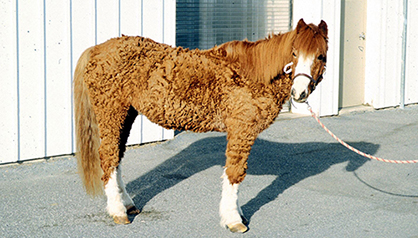New Trial Aims to Improve Clinical Control of Endocrine Dysfunction in Horses with PPID
By: Ashley Berke
New Bolton Center experts hope results will prevent subsequent laminitis lesions
The most common root cause of laminitis in horse populations worldwide is some form of underlying endocrine dysfunction, with high blood insulin being the common feature that appears to directly lead to laminitis lesions in horses with Pituitary pars intermedia dysfunction (PPID, or Equine Cushings disease) or Equine Metabolic Syndrome.
In addition to studies evaluating the effects of hyperinsulinemia on the hoof lamellae at a microscopic and molecular level, a major part of Penn Vet’s research initiative into this form of laminitis is a clinical trial—led by New Bolton Center’s Dr. Elizabeth Hodge and Dr. Andrew van Eps—to investigate better means of identifying, monitoring, and treating endocrine dysfunction, which is the primary inciting cause of the disease in these horses.
Laminitis is the most important clinical manifestation of PPID, which occurs primarily in older horses over 10 years of age. Early identification and treatment is necessary to limit the largely irreversible laminitis lesions. Once PPID cases are identified, treatment with pergolide can be very effective in controlling the pituitary dysfunction and minimizing laminitis progression. However, in many cases, there is a requirement for adjustment of the pergolide dosage in order to effectively control the disease. The new clinical trial at New Bolton Center will investigate whether the thyrotropin releasing hormone (TRH) stimulation test may allow for more accurate monitoring of PPID treatment, leading to timely and accurate adjustment of treatment in these cases.
Penn Vet’s Dr. Jill Beech performed early research on the TRH stimulation test, which has proven to be the most sensitive means of identifying PPID cases. However, its efficacy as a treatment-monitoring tool has never been evaluated. For this clinical trial, Hodges and van Eps have enrolled client-owned horses over 15 years of age, with or without diagnosed PPID (including horses currently being treated with pergolide), to have TRH stimulation and insulin testing performed on two occasions (as a baseline and then two months later). The study will evaluate whether the TRH stimulation test results differ from the current standard (baseline ACTH) and will also examine how the results of endocrine testing relate to changes in clinical parameters of disease severity. The goal is to improve overall clinical control of endocrine dysfunction in horses with PPID, which is the best way to ensure better outcomes in these horses with respect to laminitis.













